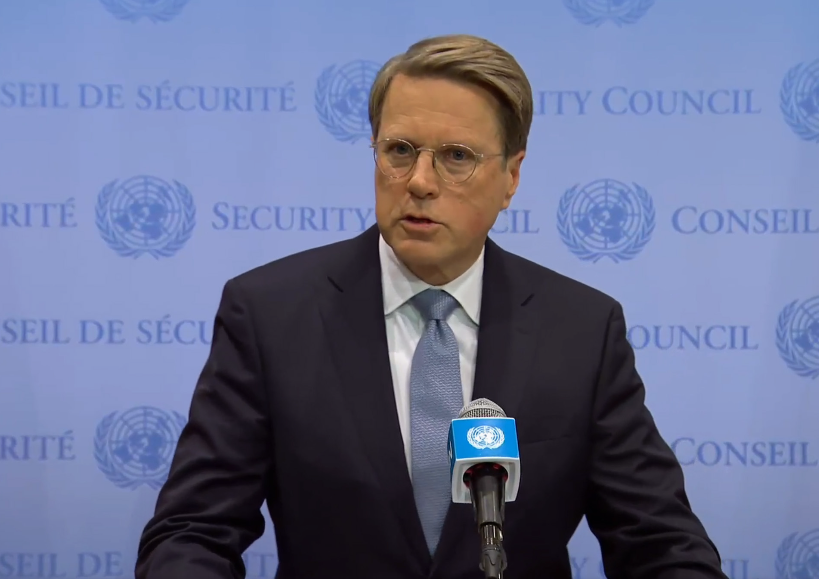On the 1st of January 2024, Slovenia officially began its mandate as a non-permanent member of the United Nations Security Council, which runs until the 31st of December 2025. International lawyer Dr Ernest Petrič believes that this is an extremely responsible task in one of the world’s most important bodies and hopes that Slovenia will be “mature enough and up to the task.” International lawyer Dr Miha Pogačnik agrees that there are a number of pressing issues to be discussed, but that this could be done by a smaller group of people rather than a team of 30.
“We are one of the fifteen countries that will discuss these crises, that will take responsibility, that will also take decisions, which is, of course, an important function for any country, especially one like ours, that has no other power than the power of argument,” believes Ernest Petrič, a professor of international law who was Slovenia’s Permanent Representative to the United Nations and, during its time as a member of the Security Council, the Secretary of State at the Ministry of Foreign Affairs.
Slovenia’s priority topics, according to Head of Mission Samuel Žbogar, will be European issues – from Ukraine to the Balkans, Armenia and Cyprus, and of course, the Middle East, especially from the perspective of human rights in Gaza. Slovenia will also focus on African countries, the campaign pledged. Petrič, however, claims that the priorities will depend on external developments. “The UN Security Council is primarily concerned with international breaches of peace and conflicts, which means that, in a way, external events dictate the pace and themes of the Security Council. It is a body that seeks to build world peace and deals predominantly with problems that threaten world peace,” Petrič said, referring to the war in Ukraine and the conflict in the Middle East.
Pogačnik: There are a number of pressing issues on the agenda
International lawyer Miha Pogačnik believes that there are a number of issues that Slovenia, as a member of the UN Security Council, should discuss. “In addition to the almost two years of Russian aggression against Ukraine, other important issues are the prevention of international terrorism by radical Islam, especially in Israel by the terrorist organisation Hamas, in the Red Sea by Yemeni para-state terrorist units, and elsewhere in the world. There is also the dangerous tension in South America between Venezuela and Guyana, arising from certain, in my opinion, quite illegitimate Venezuelan territorial claims relating to oil reserves. There is also the ever-sensitive Balkans, where the situation can turn sour almost instantaneously in Republika Srpska, Serbia and Kosovo. Although the situations seem to be historically and politically different, the undemocratic sponsors are the same, with an emphasis on the Russian Federation and Iran. I am concerned that we are hearing rather mild statements from the Ministry of Foreign and European Affairs on these serious problems, accompanied by cheap platitudes,” Pogačnik said.
International crises orchestrate the topics of discussion
Petrič believes that it is necessary to wonder which topics should be most highlighted for Slovenia’s benefit, because it is external events and international crises that orchestrate what will be discussed. Slovenia will deal with all current issues as dictated by the course of international events, which is a great responsibility.
According to the Slovenian Press Agency, Foreign Minister Tanja Fajon assured the media that the team in New York, which will consist of around 30 people, is well prepared and highly motivated, but Petrič really hopes that they will be “up to the challenge”. He believes that there is certainly someone among them who is competent enough, pointing to Žbogar, who was on the working group during the first Security Council presidency in 2000.
It was Petrič who headed the Ljubljana Working Group back then, “our mission to the UN worked brilliantly, it was headed by Danilo Türk, we had excellent cooperation, and when that mandate came to an end, we received many congratulations. We must not forget that Slovenia was already a non-permanent member of the Security Council after nine years of the country’s independent existence, I know of no similar case”, Petrič said, adding that Slovenia has stood firm on the international stage ever since.
30 people are too many, a few people would be enough
“As far as Slovenia’s teaming for the UN Security Council is concerned, the Ministry of Foreign and European Affairs has sufficient staff covering security issues in a multifaceted way through desk officers, diplomatic missions and permanent missions to the UN, NATO and the OSCE, some of whom also have concrete experience, so teaming up with possible new forces and faces is completely unnecessary and can be seen as a gift to politically likeable and probably problem-ignorant individuals, which will be paid for by the Slovenian citizens, as it always has been. Regardless of the references, the number – 30 people is clearly too high, as just representing the already formulated positions in the Security Council could already be covered by a few people,” Pogačnik believes.
The EU and NATO membership will certainly have an impact on positions
“It is a question of how the Security Council will work at all, we are in a different position today than when we were in the Security Council for the first time. We were not a member of the European Union or NATO then, so both the Russian Federation and the USA were very interested in who we would support with our vote in the Security Council,” Petrič recalled. He believes that this time, Slovenia’s decisions will probably have to be in line with European policy and, ultimately, NATO policy, because of the common foreign policy. Nevertheless, he hopes that Slovenia will again act “maturely and properly in this function” and that it will defend its own positions and “think with its own head”. This will also increase Slovenia’s importance within the European Union in developing common positions.
Tanja Brkić


